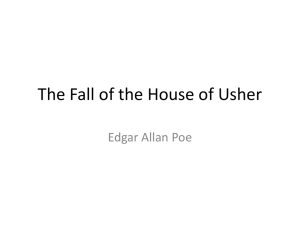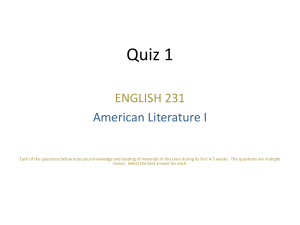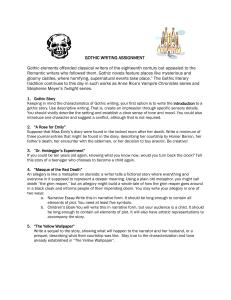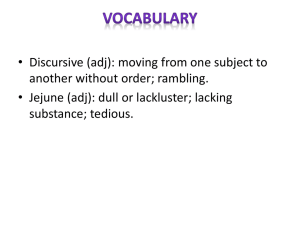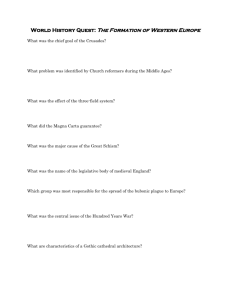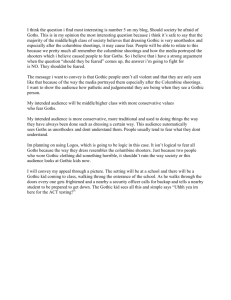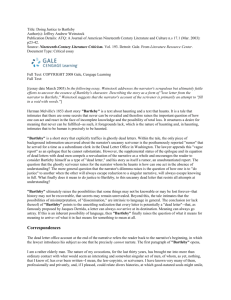Laurente Adeline Laurente Mrs. Martino AP Composition pd. 3 21
advertisement
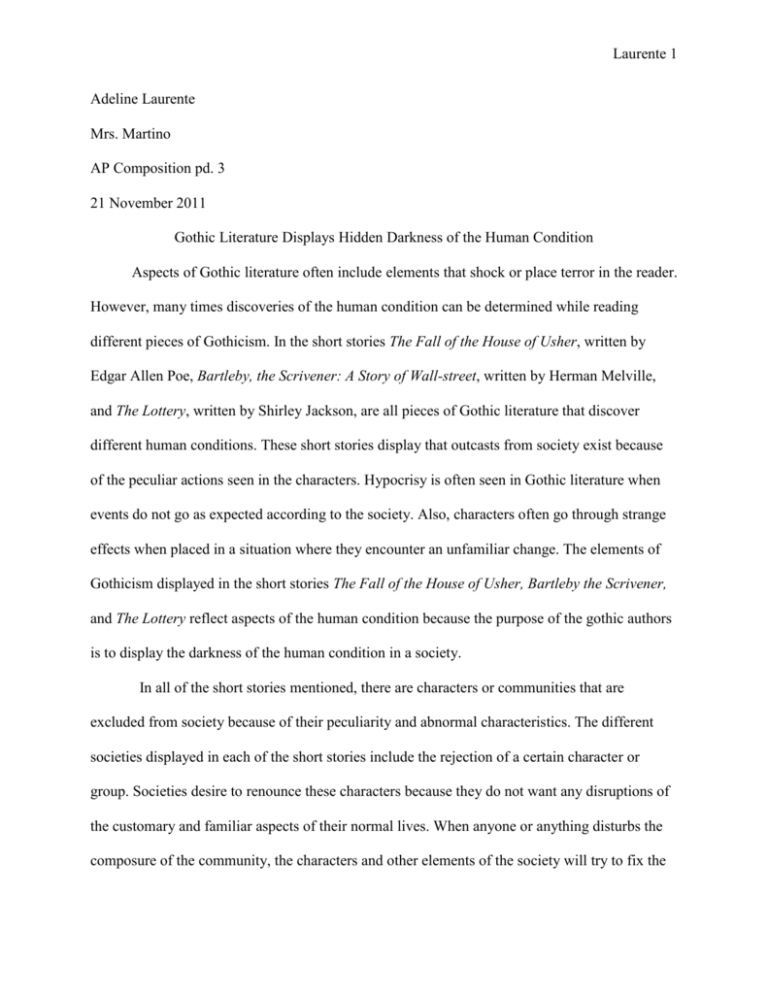
Laurente 1 Adeline Laurente Mrs. Martino AP Composition pd. 3 21 November 2011 Gothic Literature Displays Hidden Darkness of the Human Condition Aspects of Gothic literature often include elements that shock or place terror in the reader. However, many times discoveries of the human condition can be determined while reading different pieces of Gothicism. In the short stories The Fall of the House of Usher, written by Edgar Allen Poe, Bartleby, the Scrivener: A Story of Wall-street, written by Herman Melville, and The Lottery, written by Shirley Jackson, are all pieces of Gothic literature that discover different human conditions. These short stories display that outcasts from society exist because of the peculiar actions seen in the characters. Hypocrisy is often seen in Gothic literature when events do not go as expected according to the society. Also, characters often go through strange effects when placed in a situation where they encounter an unfamiliar change. The elements of Gothicism displayed in the short stories The Fall of the House of Usher, Bartleby the Scrivener, and The Lottery reflect aspects of the human condition because the purpose of the gothic authors is to display the darkness of the human condition in a society. In all of the short stories mentioned, there are characters or communities that are excluded from society because of their peculiarity and abnormal characteristics. The different societies displayed in each of the short stories include the rejection of a certain character or group. Societies desire to renounce these characters because they do not want any disruptions of the customary and familiar aspects of their normal lives. When anyone or anything disturbs the composure of the community, the characters and other elements of the society will try to fix the Laurente 2 problem and restore order. However, if they cannot find a way to fix the situation, they will try their best to remove disruption from the rest of society. In The Fall of the House of Usher the entire Usher family is ostracized from the rest of society because of their strange and unorthodox practice of incest. Gothic literature often includes a curse on a certain group of people because of an original sin committed by their ancestors. The Usher family is the victim of this curse, causing them to also be a victim to society. The narrator takes note of the Usher family’s difference as he discusses Roderick Usher and states “that his very ancient family had been noted, time out of mind, for a peculiar sensibility of temperament” (Poe 4). The rest of society notes the peculiarity of the Usher family, and because of their difference they ostracize them from their community. Gothicism often includes situations where a society excommunicates anyone who disrupts the familiar culture of expected human conditions. The exclusion of any characters showing peculiarity is also displayed in the short story, Bartleby, the Scrivener: A Story of Wall-street. The character, Bartleby, shows indifference to his required tasks as he repeatedly replies to requests with the phrase “I would prefer not to” (Melville 6). This response contradicts with the ideals of the Wall-street community. The elements of Gothicism make other characters, who are accustomed to society, look down on Bartleby’s actions. His unfamiliar actions are shocking to the rest of society, causing them to grow angry, confused, and “think that he is a little deranged” (23). When they discover that they cannot convince Bartleby to adapt to the Wall Street society, they try to exclude him and plead that someone “must take him away, sir, at once” (20). Gothicism shows that whenever the unexpected occurs and disrupts familiarity, society will pursue to remove the problem if they cannot make the disruption conform to the rest of the people. Laurente 3 The darkness of the human condition can also be displayed in the hypocrisy of characters throughout different Gothic literatures. When events contradict with the expectance of a character’s view of society, hypocrisy often occurs. Members of societies in Gothic literature often follow a similar path in life. However, whenever members of a society believe that a situation is disagreeable to their liking, they begin to grow hypocritical. In The Lottery, hypocrisy is found in the character Tessie Hutchinson. When she discovers that the ritual her town practices, which has been practiced for years, is not to her liking, she rebels. She tries to reason her way out of death by continually pleading “It isn’t fair, it isn’t right” (Jackson 7). This piece of Gothic literature shows that humans can turn on their beliefs whenever the situation is not pleasing to them. Humans who are part of a corrupt society will only find their lives at peace until a situation is not in their favor. Gothicism helps discover that humans will turn on what they are accustomed to whenever a situation is disagreeable. Gothicism also includes highly charged emotional states, which many of the characters in all of the short stories discussed encounter. The prevailing charged emotional states that occur in these particular short stories the most are terror and the feeling of the brink of insanity. The characters experience these feelings because they are placed in situations where they are threatened with change. Because they accustom themselves to the ideals of their society, they do not know how to react to a change in environment. In The Fall of the House of Usher, the narrator feels terror and insanity after being in the Usher house for too long. The environment of the Usher house changes him and he begins to feel insanity coming as “An irrepressible tremor gradually pervaded my frame” (Poe 11). In Bartleby, the Scrivener: A Story of Wall-street, the narrator and his other employees are affected by the actions of Bartleby. He changes the environment of the office and his peculiarity instills a slight terror in the other workers because Laurente 4 they do not know how to react to the mysterious change. The narrator does not know how to react to the change and admits that Bartleby’s actions “had such a strange effect upon me” (Melville 10). In The Lottery, the entire community feels terror during the actual drawing ritual. There is an unspoken fear among the people as “they grinned at one another humorlessly and nervously” (Jackson 3). Everyone in the community knows that there is a chance that a drastic change will occur in their family. Gothicism shows that humans are prone to charged emotional states when change is threatening to their wellbeing. Although the ideals of Gothic literature often display situations that are mysterious and fearful, a deeper meaning in the text can still be found. In particular, the darkness of human conditions in different societies can be found in the short stories The Fall of the House of Usher, Bartleby, the Scrivener: A Story of Wall-street, and The Lottery. Gothicism shows that any aspect or being that is different from society’s established values will be rejected. Hypocrisy will occur in people who encounter situations that do not go as expected. When placed in a situation of unfamiliar change, people will experience charged emotional states, which they usually do not know how to react to. Gothicism helps expose the problems of different societies subtly. The darkness of Gothic literature is usually the result of the different problems. Gothicism reveals the darkness of human conditions in a society that is not accustomed to any abnormalities. Laurente 5 Works Cited Jackson, Shirley. The Lottery. New York: New Yorker, 1948. Print. Melville, Herman. Bartleby, the Scrivener: A Story of Wall-street. New York: Putnam's Magazine, 1853. Print. Poe, Edgar Allan. The Fall of the House of Usher. Philadelphia: Burton's Gentleman's Magazine, 1839. Print.
